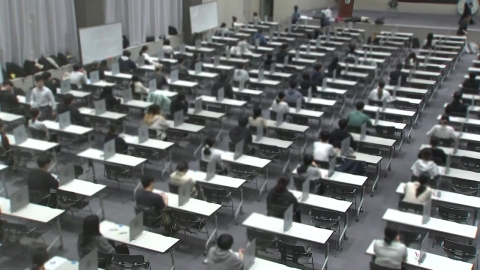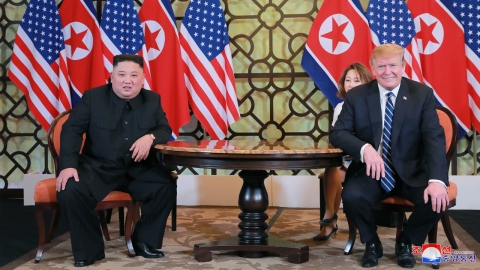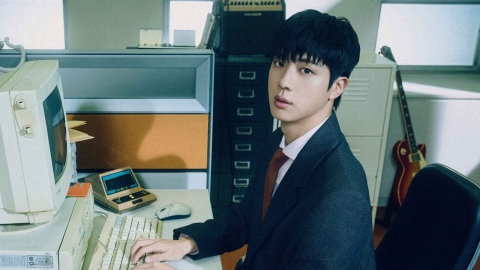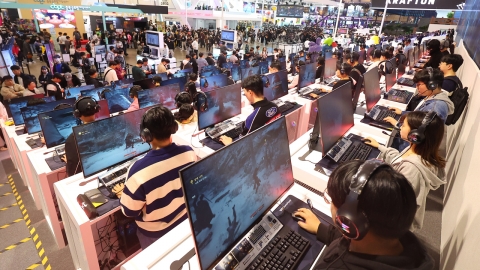■ Starring: Bong Young-sik, Guest Professor at Yonsei University
* The text below may differ from the actual broadcast content, so please check the broadcast for more accurate information. Please specify [YTN Newswide] when quoting.
[Anchor]
President Yoon Suk Yeol attended the APEC summit and sought to respond to military cooperation between North Korea and Russia.
On the other hand, as the nomination of the second Trump administration takes place one after another, foreign and security policy on the Korean Peninsula seems to need to be changed. Let's talk with Bong Young-sik, a visiting professor at Yonsei University.
President Yoon Suk Yeol had a summit with Chinese President Xi Jinping as his first bilateral meeting, where he asked China to play a constructive role in the close relationship between North Korea and Russia. How did you like it?
[Bongyeongsik]
On behalf of the Korean government, I think I told the Chinese government what I had to say. However, let me tell you that there is a question of how aggressively China will put the Korean government's request into actual action. Because what China wants is to cease the war in Ukraine, the root cause of China's concerns, as soon as possible, rather than send any clear warning message about the close ties between North Korea and Russia. Therefore, the Chinese government is expected to send a message calling for an early ceasefire rather than a clear criticism of Russia or North Korea, as China wants to end the war in the Indo-Pacific region by preventing military, economic and strategic ties between North Korea and Russia and strengthening security cooperation between countries that share values and alliances caused by the war in Ukraine. The Chinese government's statement is in line with Trump's position, so it is a political defense that is not burdensome for the Chinese government.
But let me tell you that it is actually difficult for the Chinese government to take a position to condemn the degree requested by President Yoon Suk Yeol.
[Anchor]
With the second Trump administration launched, China's counting method seems to be complicated. I think it's going to be complicated what role to play and what kind of stance to take. Some say that Trump's bromance with Putin is strengthening again. Which way do you look at it?
[Bongyeongsik]
To the extent that it strengthens bromance, it is unlikely that Trump will show intimacy with Russia. Because what the Trump administration is aiming for is a very America-first realist position that everything can be traded, isn't it? If so, when doing a bromance, it is expected that the United States will clearly anticipate the implementation of its core U.S. interests, but there is virtually no such thing. Rather, it is urgent to use direct influence on Russia to end the war in Ukraine as soon as possible, so the probability of making such a strategic choice that will lead to a bromance is not high, at least in the early stages of Trump's second term. [Anchor] The leaders of the two countries each proposed a visit to Korea and China. President Xi first proposed that President Yoon Suk Yeol visit China, and our president suggested visiting Korea, but you think we should also look at the part of economic cooperation, right?
[Bongyeongsik]
That's right. It is certainly a very good sign that the South Korean President and Chinese President Xi Jinping held such a bilateral meeting at the APEC summit. Even if the relationship between the leaders is uncomfortable, the more it is to have such a direct dialogue, the better. My concern, however, is that President Yoon Suk Yeol's conciliatory remarks were necessary to cover China, but this also poses a great danger. We have to take a very cautious step between China and the United States. Let me first say that no matter how positive and good intentions our message to China contains, there is a possibility that the Trump administration will take it wrong, so we should be careful. What I mean is that it is good to see President Yoon Suk Yeol again after the Bali meeting two years ago in his remarks at the summit with President Xi Jinping. And based on a common belief in multilateralism and free trade, it was then decided to develop Korea-China relations. Let's keep it going. There's nothing wrong with hearing it. Isn't multilateralism and free trade the same concepts that the United States used to criticize China? China does not act responsibly as a permanent member of the UN Security Council. China is coping with countries that share values because it attempts to unilaterally change the status quo by force. China should protect multilateralism. The U.S. kept talking like this.
However, China used multilateralism to change its position from the American offensive. So multilateralism is internally South-French multilateralism. From the perspective of the United States, multilateralism continues to be discussed in an advantageous direction, and from the perspective of China, multilateralism is being discussed in order to defend its position. So, from China's point of view, multilateralism is emphasized by the United States, which refers to multilateralism, but in fact, it unilaterally isolates and hits China in cooperation with other countries. Military tensions are rising around the world because of the unilateral security policy of the United States. I said to stop the introductory strategy. The same goes for free trade. The United States keeps saying that China is violating free trade. So Trump also hit the tariff bomb, and the Biden administration put technology and export controls on China. But from China's point of view, we're talking about free trade.
To attack the United States. It is a violation of free trade and fair trade principles to hit Korea's tariff bomb on China during the first Trump period and to subsidize domestic companies prohibited by the WTO during the Biden administration. China is truly free trade, and the U.S. talks about free trade, but in actual policies, chip 4, inflation reduction legislation, or subsidies for domestic companies. Why not put China in chip 4. If the U.S. really does free trade, Korea should also play Chip 5, didn't Chinese Ambassador to Korea Xing Haoming say? So, if we talk about free trade and multilateralism, and President Yoon Suk Yeol says that South Korea and China have common beliefs about this, China will welcome it, but from the Trump administration, South Korea is leaning toward China. There is room for misunderstanding that South Korea agrees with China's criticism of the United States. So, from the Trump administration's point of view, multilateral security is good, and then they will say, "Don't just rely on the U.S., a NATO ally, but raise the NATO financial contribution because it's multilateralism." Korea's multilateral security? Good, then shouldn't we raise the defense cost share more, fairly? I can talk like this. Does Korea talk about free trade with China? I'm saying it's good.
If so, let's start real free trade by properly catching acts that violate free trade, even if we hit U.S.-first and universal tariffs. Now, while talking about free trade, in fact, trading countries are exploiting the United States, so a reset is needed. Then, if we say let's do free trade and fair trade, it's right from the standpoint of free trade to abolish subsidies for electric vehicles during the Biden administration and stop government subsidies for automobiles, electric vehicles, and semiconductors. Will that really benefit us? So, it is true that we talked about Korea's position on multilateralism and free trade, which China is using well, because it is the first summit meeting with President Xi Jinping in a long time. But if you keep talking about this, I'll tell you first that there's a risk here because not only China will hear this story, but also the United States.
[Anchor]
Following the Korea-China summit, he also met with the leaders of Korea, the U.S., and Japan We decided to adopt a joint statement condemning Russia-North Korea illegal military cooperation and establish a secretariat for cooperation between South Korea, the U.S., and Japan. What meaning can we give to the meeting between the leaders of South Korea, the U.S., and Japan before the launch of the new Trump administration?
[Bongyeongsik]
Since the Biden administration's term is until January 19, 2025, the leaders of the three countries agreed to come up with a plan to minimize the achievements of three-way security cooperation that have been accumulated for more than three and a half years. So, I would like to say that the launch of the trilateral cooperation secretariat at a practical level is a great achievement in laying the groundwork for minimum maintenance, although there are various uncertainties about trilateral cooperation after the launch of the Trump administration.
[Anchor]
During this trip to South America, I also pushed for a meeting with President-elect Trump.I don't think the meeting took place. Some analysts say that Trump is distancing himself from Korea-Japan relations compared to the past.
[Bongyeongsik]
I don't think I can necessarily see it that way. Because there was such an exception with Japanese Prime Minister Abe in 2016 that the government would hold a bilateral meeting with foreign leaders before the official inauguration of the government on January 20, 2025.Ma was very controversial at the time, too. And even though Abe broke with such convention and had an unofficial golf meeting with the president-elect of the United States, after that, the United States' policy toward Japan was not so positive or conciliatory. For example, after Trump was elected, he declared his withdrawal from the TPP. So, no matter how much diplomacy that relies on personal chemistry and chemical friendship is used, the results are not necessarily guaranteed, so it was not such a diplomatic event that we could put our all into it.
Also, it is hard to say that it is a major failure of Korean diplomacy to take the same position in all countries to take a cautious step toward meeting with foreign leaders as president-elect. But let me tell you one thing that I'm concerned about, even in the security office, we're going to pursue a win-win with the Trump administration. As in the first period of the second Trump administration, it is expected that the U.S. will use such pressure diplomacy as America First, Make America Great Again, but in the end, the U.S. is also predicting that if we persuade them well, we will choose a win-win.
However, even if they say the same thing, it depends on the person who hears it and it depends on the context, so our government officials will have a lot of difficult negotiations with the United States in the future, and I would like to express it differently that it would be good for the U.S. to accept it because it is a win-win. Trump himself hates the word win-win. I read a book that President-elect Trump wrote about entering politics. the art of negotiation There's a very impressive part there. In business, the best outcome of negotiations is win-win. It's said that both directions are satisfied. I think it's trash, I said that. Why do you end it with a win-win? Win-win was something I still had to get from over there, but I let him go. Negotiating requires me to push until I achieve 100% of my gains. I remember this part. If you say win-win, isn't President Trump picking his people based on loyalty?
If so, we will have a negotiation that reflects President-elect Trump's personal philosophy, but when we said it was a win-win for us to do this, we still have something to get from Korea for those representing the Trump administration in the United States. If the Korean side says this, there is a high probability that the Korean side wants to be guaranteed to take a small amount. I'm not writing the story of win-win, I'm the negotiators representing America First, so the Trump administration. I'm telling you again that the Trump administration has won 100% of the time, giving you the foundation to go home and say that we actually have to protect our interests.Ma is not saying that the win-win we're talking about is wrong.
However, how the other person accepts and uses words. Accordingly, shouldn't we calculate in advance how well we can keep the interests we want to protect or rather lose money? Rather than a win-win, we should negotiate by giving room for propaganda with a unilateral victory by the United States, which is consistent with Trump's America-first policy, but in fact protecting our interests. It's a very difficult game. What is not impossible is that Trump was greatly helped when he was elected in 2016, when the Democratic government signed the NAFTA North American Free Trade Agreement, leaving all U.S. jobs to Mexico and hard-working honest U.S. workers out of work. This convinced voters that Michigan, Pennsylvania, and Wisconsin, especially where there are many working class voters, all voted for Trump. It worked that the Democratic Party should take responsibility for NAFTA. So, we abolished NAFTA, but at the same time, there were a lot of American companies that benefited from building factories in Mexico, right? Because it can lower the cost of labor. NAFTA was eliminated, but separately, the United States and Mexico signed another agreement equivalent to a trade agreement. In that way, the U.S. and South Korea can be seen as a one-sided winner over the official agenda, but it is also important for the U.S. government to protect the interests of the entire U.S. economy or important interest groups, so even if we appear to have lost and lost, we should consider this position and see the Trump administration reflect our position to some extent.
[Anchor]
Ahead of the launch of the second Trump administration, it is becoming important what position we should take in the complex world situation.
[Bongyeongsik]
For example, President Trump will abolish Chip 4 if I'm elected, semiconductors. Our companies are concerned. If I'm elected, I'll repeal $7,500 in tax benefits for electric vehicles in the Inflation Reduction Bill. It's a very worrisome situation for our automobile company. Because by September, we looked at the trade balance surplus and it was $3.983 million. The Trump administration in the United States is likely to target our car exports because our car exports account for 44.5% of
But we have to look at the moon where the fingers are pointing, not just at the fingers. So if the inflation reduction bill and these subsidies are abolished, not only our automakers and semiconductor companies will lose money, but also the U.S. domestic companies that Trump wants to protect and foster.
So these companies are sending a message to the Trump administration that they don't want to do about inflation-reduction bills, abolishing subsidies. So, what's at stake for us is not whether the inflation-reduction bill is abolished or maintained, but it's about subsidies, right? Also, even if there are no subsidies beyond subsidies, isn't it about how competitive we continue to be in the US domestic semiconductor market and the automobile market?
So it's important not just to look at the bill, but to look at what ultimately values and benefits we need to pursue, to negotiate flexibly and respond specifically.
[Anchor]
The nomination of the second Trump administration is also taking place one after another, and he pointed out the economic aspects a little earlier. From our point of view, who will be the head of foreign affairs and security is also a very important part. Former Congressman Gebbirds has now been nominated as Director of National Intelligence. He is said to have been a hardliner on North Korea's nuclear weapons development, will there be any changes?
[Bongyeongsik]
As I said earlier, the most important factor to consider is loyalty in the selection of Trump's second term. How faithfully the people President-elect Trump will work with reflect his philosophy. without so-called individual play Because President Trump was a newcomer politically in the first term, he did not have prior knowledge of Washington's political circles or experts or high-ranking officials in the government. So, I made the appointment based on recommendations from people around me, but in fact, if you look at the records again at that time, the lives of major high-ranking officials appointed by Trump were not long. Didn't the Secretary of State announce his dismissal on Twitter during his trip to the Middle East? So what President Trump was convinced at the time was that in the end, he had to appoint someone that I could trust, that he could go with me all the way. So you have your own political philosophy and beliefs, whether it's the Director of National Intelligence Gabbard or the Secretary of Defense or Collins of the Department of Health. Ultimately, however, it is highly likely that President Trump will make 100% of his efforts to realize the policy objectives he is aiming for.
[Anchor]
During Trump's first term, the top-down diplomacy was effective, with the leaders of the countries leading the negotiations at the forefront, but some predict that it will not be easy during Trump's second term. Will it also have an impact on North Korea policy?
[Bongyeongsik]
What is President Trump aiming for? He said that it is more important to achieve results even if you say something rude than how to do it, and what contributed to Trump's election is that although voters have many concerns about the political leader Trump, and it is disturbing to see his remarks and actions, one thing that has been proven certain in the first four years of his term is that Trump's election pledges have been put into action. So in the end, the most important stance is the outcome in Trump's second period, as it seems that such a stance will continue to be maintained in Trump's second period. So, if the results are guaranteed, we can use a direct top-down strategy. Or, in some cases, we may prefer bottom-up and negotiation through working-level officials first, so in the end, if we look at the results that Trump, the political leader, and the president of the United States, are aiming for over the next four years, we can accurately grasp the core interests and the nature of the strategy, regardless of what strategy the Trump administration has or what kind of appointments it has.
[Anchor]
There were many predictions that North Korea would provoke after the U.S. presidential election.There was a degree of radio disturbance. There is no major provocation yet, so what do you think? Is North Korean leader Kim Jong-un also a little wary of Trump's position on North Korea?
[Bongyeongsik]
Even if I were General Secretary Kim Jong-un, I would have been quiet. Because if there is a seventh nuclear test or a large-scale provocation here, Trump has to express his position to some extent. Why would General Secretary Kim Jong-un, who wants to maintain a good relationship with Trump, do something that could be a burden to Trump? And even if it conducts its seventh nuclear test, isn't the main agenda of Trump's security diplomacy two wars? Russia and Ukraine wars, Israel and Hamas wars. Even if North Korea provokes here, there is no possibility that it will shake up the U.S. politics and turn the Trump administration's attention to resolving the North Korean nuclear weapons problem rather than ending the two wars early. Then I don't have that many strategic cards. I use it recklessly according to this? Rather, it would be wiser to wait for the election of the Trump administration and then respond appropriately to it. In particular, from the perspective of North Korea, we have now sent large-scale troops to Russia.
Wouldn't the actions the U.S. will take against North Korea be affected not only by the North Korean nuclear issue but also by how the war in Ukraine will end up in the future? Then, what military and financial support the U.S. government will provide to Ukraine in the future, if the Trump administration has not been launched yet. It's not clear how to put pressure on Russia's Putin government to pursue an early end to the war in Ukraine, but North Korea acts provocative here? If so, waiting is the most reasonable option for the Kim Jong-un government because North Korea's strategic position is likely to be strengthened rather than strengthened, such as rejection or negative views toward North Korea.
[Anchor]
We showed it to you on the screen.In the midst of this, Chairman Kim Jong-un's on-site guidance in the area where he develops self-destructive drones was disclosed. How should I interpret this?
[Bong Young-sik]
We should wait and do what we can, while continuing our efforts to advance direct negotiations with the United States and the means of pressure on the South. I don't know when I'll take the exam, but if it's almost certain to take the exam, shouldn't I study the previous questions in several subjects? You can't just waste your time. So, if we emphasize something like this, it can be used as a message of pressure on South Korea and can confirm the positive foundation in the export of military supplies, which has helped revive the North Korean economy.
[Anchor]
So far, I've talked with Bong Young-sik, a visiting professor at Yonsei University, about the complex world situation. Thank you for talking with me today.
※ 'Your report becomes news'
[Kakao Talk] YTN Search and Add Channel
[Phone] 02-398-8585
[Mail] social@ytn. co. kr
[Copyright holder (c) YTN Unauthorized reproduction, redistribution and use of AI data prohibited]




![[Yeterview] Choi Hye-sun "The opposite of 'Bloody Game' and 'Solo Hell'..."I'm looking forward to your new side".](https://image.ytn.co.kr/general/jpg/2024/1116/202411161109572531_h.jpg)



![[G-Star 2024] HiveIM's first outing raises expectations for new works](https://image.ytn.co.kr/general/jpg/2024/1115/202411151733271198_h.jpg)
![[G-Star 2024] Gravity, Main IP 'Ragnarok 3', etc. will be released for the first time.](https://image.ytn.co.kr/general/jpg/2024/1115/202411151613167158_h.jpg)